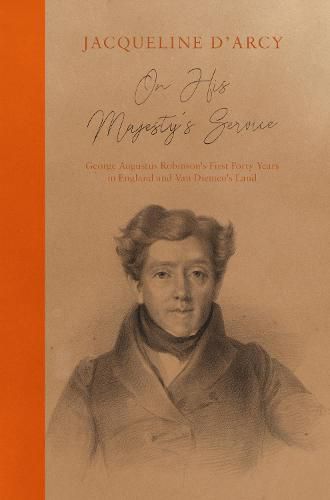Readings Newsletter
Become a Readings Member to make your shopping experience even easier.
Sign in or sign up for free!
You’re not far away from qualifying for FREE standard shipping within Australia
You’ve qualified for FREE standard shipping within Australia
The cart is loading…






This title is printed to order. This book may have been self-published. If so, we cannot guarantee the quality of the content. In the main most books will have gone through the editing process however some may not. We therefore suggest that you be aware of this before ordering this book. If in doubt check either the author or publisher’s details as we are unable to accept any returns unless they are faulty. Please contact us if you have any questions.
George Augustus Robinson’s voice, both in the past and in the contemporary world, is an important one. He has been used and sometimes abused by historians and others in debates about colonisation and Aboriginality. This partial biography (Robinson’s first forty years), through its thorough and forensic approach, presents a new Robinson - not the ‘Black Robinson’ of Rae-Ellis, James Bonwick, John West and James Erskine Calder, nor the ‘White Robinson’ of Mark Twain - but a ‘Grey Robinson’, a grey robin with a red breast. Robinson was an ordinary man with a heart which burnt for the evangelical cause.
Myths that have grown up about Robinson’s class, character and the trajectory of his public life are dispelled and a new, more subtle gradated way of considering his life and writings is offered. Robinson’s life is used here as a lens; a way of better understanding the networks that underpinned the British world during the nineteenth century. Moreover, this biography provides an opportunity to examine how those networks operated within a colonial paradigm.
This biography uncovers Robinson’s sophisticated development and management of a global network and interlocking directorate which ultimately led to his appointment as Storekeeper at Brune Island - the humble beginning of his Friendly Missions and career in protectionism. This network also upheld Robinson as an expert on the Tasmanian Aborigines in his later life.
What is revealed is that the course of Robinson’s life was sustained by networks that operated equally well both at the centre and periphery of empire: from Hobart to the metropolis. In this way he was both a child of metropolis and a man of the empire.
$9.00 standard shipping within Australia
FREE standard shipping within Australia for orders over $100.00
Express & International shipping calculated at checkout
This title is printed to order. This book may have been self-published. If so, we cannot guarantee the quality of the content. In the main most books will have gone through the editing process however some may not. We therefore suggest that you be aware of this before ordering this book. If in doubt check either the author or publisher’s details as we are unable to accept any returns unless they are faulty. Please contact us if you have any questions.
George Augustus Robinson’s voice, both in the past and in the contemporary world, is an important one. He has been used and sometimes abused by historians and others in debates about colonisation and Aboriginality. This partial biography (Robinson’s first forty years), through its thorough and forensic approach, presents a new Robinson - not the ‘Black Robinson’ of Rae-Ellis, James Bonwick, John West and James Erskine Calder, nor the ‘White Robinson’ of Mark Twain - but a ‘Grey Robinson’, a grey robin with a red breast. Robinson was an ordinary man with a heart which burnt for the evangelical cause.
Myths that have grown up about Robinson’s class, character and the trajectory of his public life are dispelled and a new, more subtle gradated way of considering his life and writings is offered. Robinson’s life is used here as a lens; a way of better understanding the networks that underpinned the British world during the nineteenth century. Moreover, this biography provides an opportunity to examine how those networks operated within a colonial paradigm.
This biography uncovers Robinson’s sophisticated development and management of a global network and interlocking directorate which ultimately led to his appointment as Storekeeper at Brune Island - the humble beginning of his Friendly Missions and career in protectionism. This network also upheld Robinson as an expert on the Tasmanian Aborigines in his later life.
What is revealed is that the course of Robinson’s life was sustained by networks that operated equally well both at the centre and periphery of empire: from Hobart to the metropolis. In this way he was both a child of metropolis and a man of the empire.